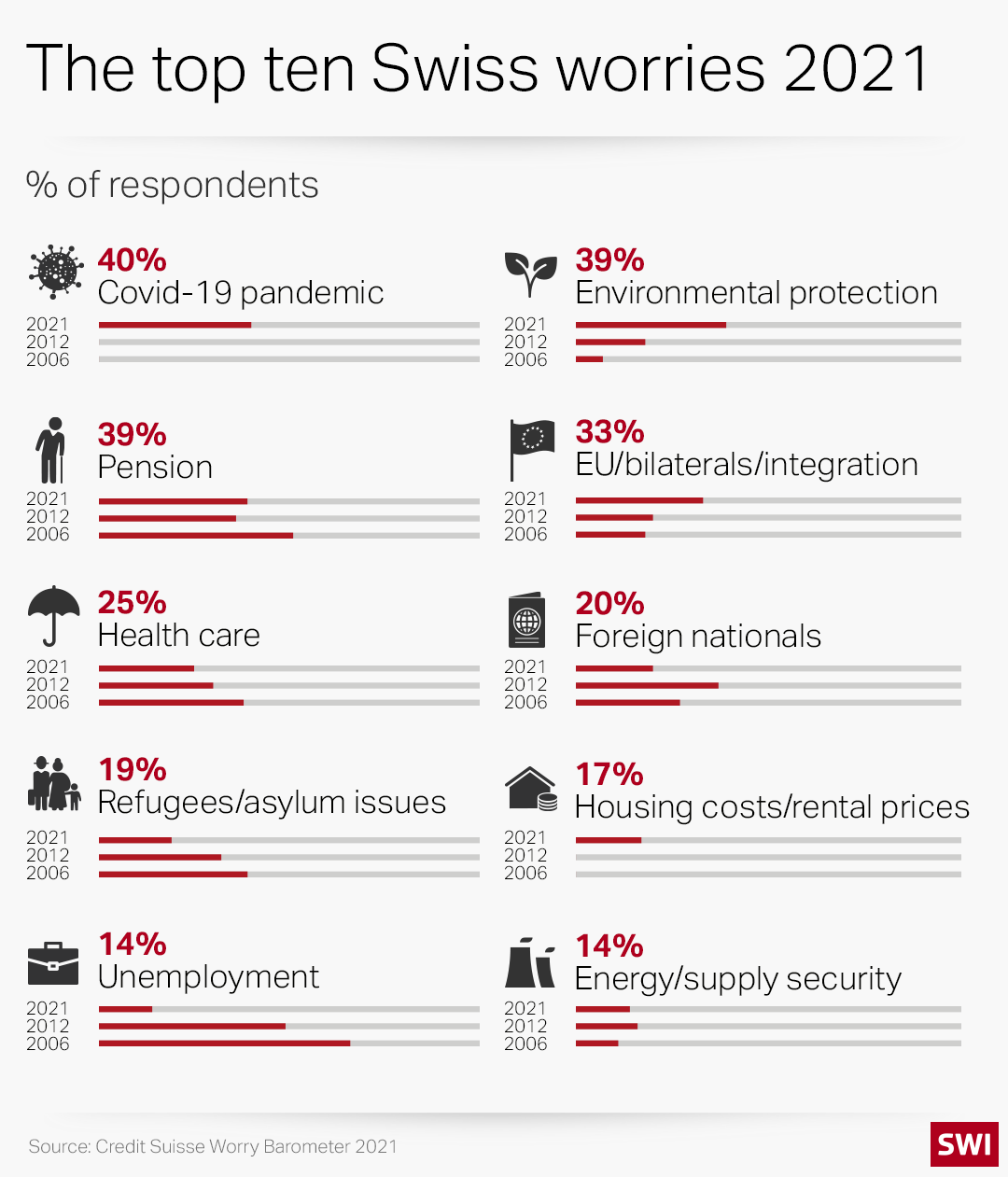Swiss equally worried by Covid, climate and retirement

The Covid pandemic remains one of the main causes of concern for the Swiss, according to this year’s Credit Suisse Worry Barometer. However, almost the same number of respondents are stressed about climate change and having enough money when they retire.
For the first time a trio of worries topped the annual barometerExternal link, published on Thursday. While 40% of respondents ranked the pandemic and its consequences among their five main concerns (down from 51% last year), 39% said global warming and retirement provisions were their main concerns.
Credit Suisse said the share of people concerned about the climate had increased relatively strongly – by ten percentage points – since the previous barometer.

More
Pandemic very much at the top of Swiss ‘worry list’
The five most pressing topics for 2021 also include the state of Switzerland’s relationship with Europe (33%) and changes (in terms of costs) to healthcare and health insurance plans (25%). Migration and asylum ranked sixth and seventh, and 17% of voters listed higher housing costs and an increase in rents among the ten largest challenges.

When Swiss people were asked about the most urgent issue that needs to be addressed, the most common response was also the Covid pandemic and its effects (20%), followed by environmental protection and climate change (18%).
For the Credit Suisse Worry Barometer 2021External link, the research institute gfs.bern surveyed 1,722 eligible voters throughout Switzerland between July and August. The sampling error is ±2.3 percentage points.
“The Covid-19 pandemic, which went straight to first place in last year’s Worry Barometer, is now sharing the lead with two other concerns. Above all, this probably demonstrates the trust of the population in the ability of Switzerland and its leaders to stay strong,” said Manuel Rybach, Global Head of Public Policy and Regulatory Affairs at Credit Suisse.
“This confidence is also reflected by the change in the number of people who are concerned about unemployment. Although more than a million employees in Switzerland were on short-time working for a while, and the issue of unemployment was the number one worry in this country at one time, it is losing significance even in these uncertain economic times and has reached a record low this year in the Worry Barometer.”

More
Pandemic pushes more Swiss businesses to short-time working
Social justice issues
Unemployment and energy supply issues were both a concern for 14% of respondents.
“Classic worries, such as unemployment or immigration, seem to be fading gradually into the background,” said Cloé Jans from the gfs.bern research institute, which has been conducting the Worry Barometer on behalf of Credit Suisse since 1995.
“Issues of a more post-materialistic nature that focus on social justice as a concern are gaining momentum. The question is whether this marks the start of a gradual and long-term shift in the Worry Barometer or is just a temporary phenomenon at the present time. As for topics such as the environment and equal rights, which are not just a short-lived trend but part of the electorate’s core values – especially for younger generations – these will most likely persist in the future.”
Almost two-thirds of respondents assessed their economic situation positively: 65% said they were doing well or very well economically – exactly the same number as last year. Over the past 25 years this figure was exceeded only in 2016 (68%).
When asked about the future, a clear majority were optimistic that they could at least maintain (75%) or even improve (12%) their current prosperity. Compared with a year ago, the share of respondents who expected their financial situation to decline returned to pre-pandemic levels (10%).
“The recent past shows that Switzerland is fairly resistant to crises overall and is very resilient, at least when looking at the opinions of respondents,” Rybach said.
“As for the question about their current economic health or their assessment of their economic situation in the future, for instance, crises such as the financial crisis (starting in 2008), the euro crisis (starting in 2010), the Swiss franc shock (2015), and now the Covid-19 pandemic have not led to much lower results in the Worry Barometer.”

More
Coronavirus: the situation in Switzerland

In compliance with the JTI standards
More: SWI swissinfo.ch certified by the Journalism Trust Initiative










Join the conversation!